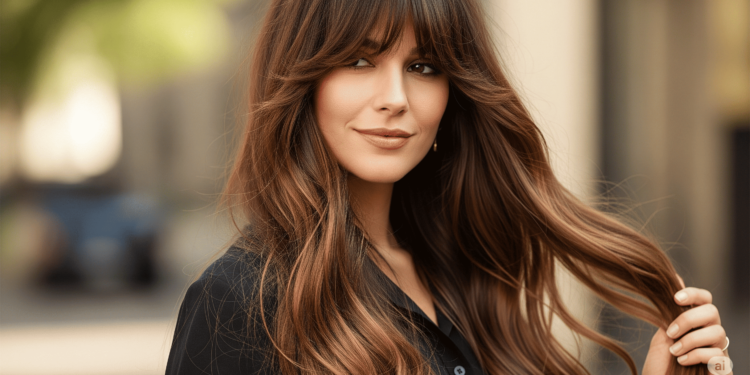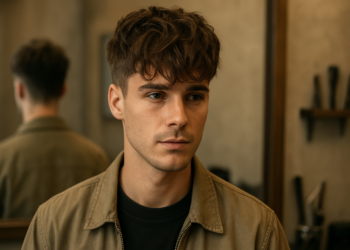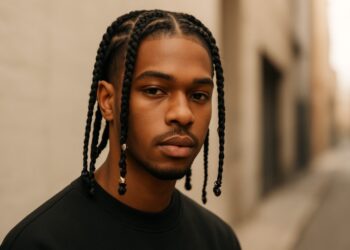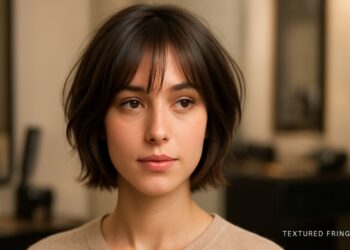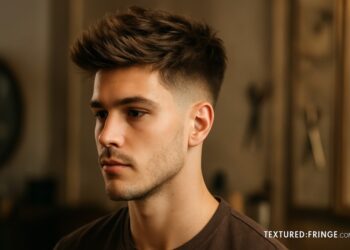There’s something timeless about long hair—it flows, frames the face, and carries endless styling possibilities. But let’s be honest, keeping long hair from looking heavy or flat can be tricky. That’s where the textured fringe comes in. Adding a fringe (or bangs, depending on where you’re from) with layers and movement can completely transform your look.
The challenge? Striking the perfect balance between the fringe, the layers, and the natural flow of your hair. Too much texture, and it looks choppy. Not enough, and it feels weighed down. I’ve been on both ends of that spectrum—walking out of the salon with hair that felt magazine-worthy, and other times, regretting that I looked like I tried to cut my own bangs at midnight.
If you’ve ever considered a textured fringe for long hair, this guide is for you. We’ll talk about how to blend layers with your fringe, what works with different face shapes, how to style it day-to-day, and the little mistakes to avoid.
Why Choose a Textured Fringe with Long Hair?
Long hair can sometimes lack shape, especially if it’s all one length. A textured fringe solves this problem by:
- Adding movement: Texture creates dimension, so your hair doesn’t look flat.
- Softening the face: A fringe can balance features, highlight cheekbones, or make the jawline appear softer.
- Breaking monotony: Long hair without layers or fringe can look heavy. Adding texture gives your hairstyle personality.
- Styling flexibility: You can part it, push it to the side, pin it up, or leave it down for a casual vibe.
The Key: Balance Between Layers and Fringe
The trickiest part isn’t getting a fringe—it’s making sure the fringe blends with the rest of your long layers. Imagine wearing a flowy dress with a stiff neckline—it just wouldn’t match. The same goes for hair.
Here are a few ways to get the balance right:
1. Layer Placement Matters
- Long layers keep the overall hair length intact while removing bulk.
- Your stylist should layer the hair around the face so that the fringe doesn’t feel disconnected.
- Avoid layers that are too short around the face, unless you’re going for a more edgy, shag-inspired look.
2. The Thickness of Your Fringe
- Thicker fringes pair well with more layering throughout the hair.
- Wispy fringes (light, airy) work better with subtle or minimal layering.
Think of it like seasoning food—you don’t want too much of one element to overpower the dish.
3. Blend, Don’t Chop
A well-done textured fringe should “melt” into the sides of your hair. If you see a hard line between your bangs and layers, it might need more softening.
Which Face Shapes Work Best with a Textured Fringe?
Not all fringes are created equal, and not all face shapes benefit from the same type. Here’s a quick breakdown:
- Oval face: Lucky you—almost any fringe works, but textured ones keep the look modern.
- Round face: Go for longer, side-swept textured bangs to elongate the face.
- Square face: Soft, wispy textures help balance sharp angles.
- Heart-shaped face: A curtain-style textured fringe is perfect—it draws attention to the eyes without overwhelming the forehead.
- Long face: A fuller textured fringe that sits just above the brows helps add width.
Styling a Textured Fringe: Everyday Tips
Having a textured fringe doesn’t mean you’re locked into one look. In fact, it’s one of the most versatile options for long hair. Here’s how to style it:
1. Air-Dried Effortless Look
If you have natural waves, scrunch your fringe lightly with a texturizing spray and let it air dry. It’ll blend perfectly with layered lengths.
2. Sleek & Polished
Use a round brush and a blow dryer to curl the fringe slightly under, but avoid making it too “bouncy.” The goal is smooth movement, not a 90s sitcom look.
3. Side-Swept Drama
Push the fringe slightly to one side for a romantic, face-framing effect. Perfect for nights out.
4. Updo-Friendly
The beauty of a textured fringe is that when you throw your long hair into a bun or ponytail, the fringe keeps things stylish. You won’t look like you just “pulled your hair back”—it’ll feel intentional.
Maintenance: Keeping the Balance
Here’s the honest truth—fringes require upkeep. But textured ones are far more forgiving than blunt cuts.
- Trimming: Every 4–6 weeks keeps the shape intact.
- Washing: Fringes tend to get oily faster. A quick spritz of dry shampoo can save the day.
- Styling Tools: A mini flat iron or small round brush is your best friend for taming cowlicks.
And here’s a little hack: if you’re growing tired of your fringe, textured bangs grow out softer and blend into long layers much easier than blunt ones.
Common Mistakes to Avoid
Even the best ideas can go wrong if executed poorly. Watch out for these pitfalls:
- Too much weight in the fringe – It’ll overwhelm your face.
- Disconnected layers – Your fringe should flow with your layers, not sit separately.
- Ignoring your hair texture – What works for pin-straight hair might not suit naturally curly textures without adjustments.
- Cutting it yourself after a glass of wine – We’ve all thought about it, but trust me, it’s rarely worth it.
My Personal Experience with Textured Fringe
I’ll share a quick story: The first time I asked for a textured fringe, I walked into the salon with a Pinterest board full of celebrities. My stylist smiled and said, “We’ll find your version of this, not theirs.”
That stuck with me. What looked great on Dakota Johnson might not suit my rounder face and thick hair. Instead, we worked with a longer, feathered fringe that blended into soft layers. It felt natural, easy, and grew out gracefully.
So, while inspiration is great, the real win is tailoring it to your face shape, lifestyle, and hair type.
Quick Styling Products That Help
If you’re planning to get a textured fringe with long hair, a few products will make your life easier:
- Lightweight texturizing spray – adds movement without weighing it down.
- Dry shampoo – keeps bangs fresh between washes.
- Mini straightener – perfect for touch-ups.
- Flexible hold hairspray – keeps fringe in place without stiffness.
Suggested Image Prompts
- Featured Image: “Woman with long layered hair and soft textured fringe, natural daylight, casual styling.”
- Section Break Visual (Face Shapes): “Illustration of different face shapes with recommended fringe styles.”
- Styling Examples: “Four side-by-side images showing textured fringe styled air-dried, sleek, side-swept, and with an updo.”
- Before & After: “Comparison of long straight hair without fringe vs. with textured fringe and blended layers.”
Final Thoughts
A textured fringe for long hair is one of those small changes that make a huge difference. It’s chic, versatile, and much easier to maintain than people think. The secret lies in the balance—blending your fringe with layers so everything moves together.
If you’re ready for a change but don’t want to sacrifice your length, a textured fringe might just be the perfect update. Start with something soft, talk openly with your stylist, and remember—it’s hair. If it doesn’t work out exactly how you imagined, it’ll grow, and you’ll have learned what does (and doesn’t) work for you.
Q1: How often should I trim a textured fringe?
Every 4–6 weeks is ideal, but you can stretch it to around 8 weeks since textured bangs grow out more naturally than blunt ones. Regular trims help maintain the shape and keep your fringe looking fresh.
Q2: Will a textured fringe work with curly hair?
Yes! Curls actually enhance the look of a textured fringe by adding more movement and dimension. Your stylist may cut it slightly longer to account for natural curl shrinkage.
Q3: Can I style a textured fringe without heat?
Absolutely. A touch of leave-in cream or a light texturizing spray is usually enough to let it air-dry beautifully into a natural, effortless look.
Q4: What if I don’t like how it looks?
The great thing about textured fringes is that they blend into long hair as they grow out. This makes them far less of a commitment compared to blunt bangs, giving you flexibility if you change your mind.
Q5: Does a textured fringe suit thin hair?
Yes, but the trick is to keep it light and wispy. Overly thick fringes can make fine hair look stringy, whereas a softer approach adds volume and movement.
